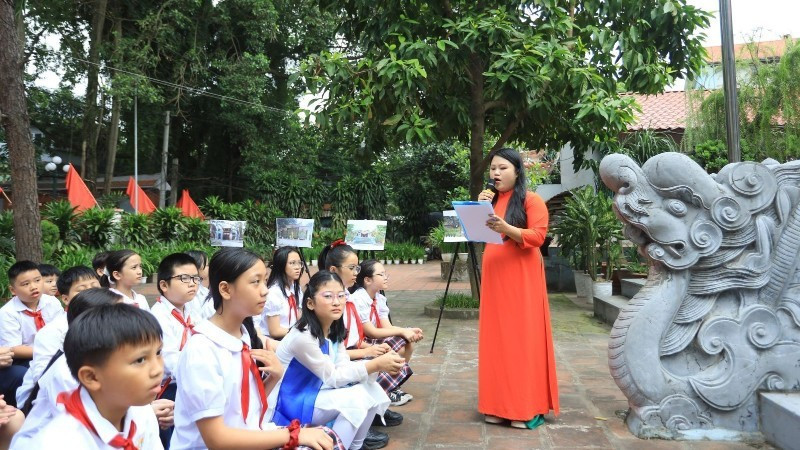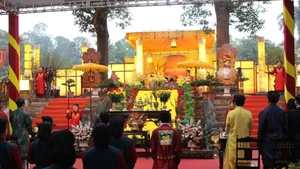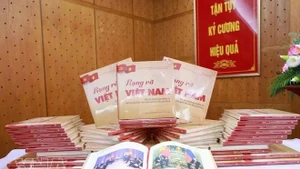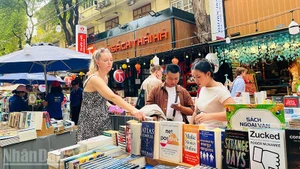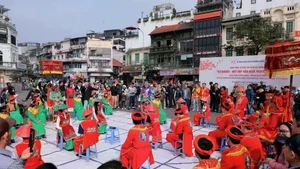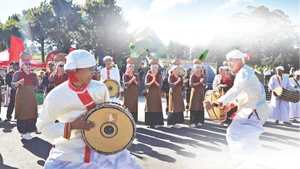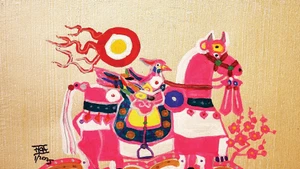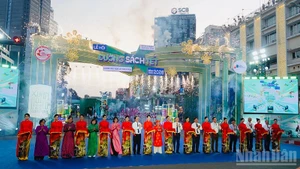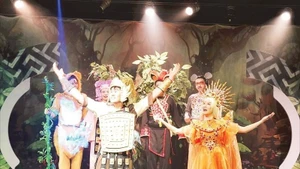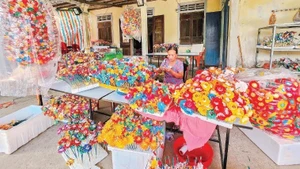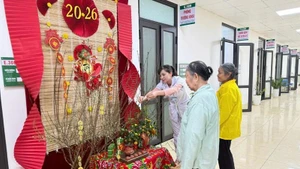Culture is not only a valuable asset but also a decisive driving force and ultimate goal in the construction and development of the capital. However, this requires individuals and families who embody cultural values as the core foundation.
The city has focused on instilling the values of Thang Long – Ha Noi culture into its citizens right from their school years, alongside formal education. This is seen as deep roots, strong foundation to fostering the culture and people of Ha Noi.
Helping pupils understand their own streets and villages
Ha Noi currently boasts 6,489 recognised heritage sites. Visitors to these places are often surprised to encounter large groups of students actively participating in learning and experiential activities at the sites.
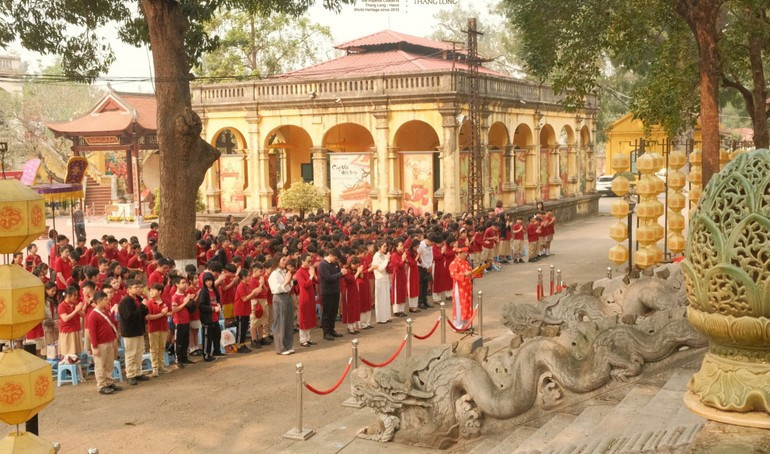
This is a key element of the city’s implementation of the local history education programme. Students across all education levels are no longer confined to dry classroom lectures, but are now taken on site visits and direct experiences at local heritage sites. These activities help lay a foundational understanding of the capital through exploration of important historical landmarks such as the Thang Long Imperial Citadel, the Temple of Literature – Quoc Tu Giam, and the Co Loa Citadel.
Since 2018, the Ha Noi Department of Education and Training has signed a heritage education cooperation programme with the Thang Long Heritage Conservation Centre, integrating educational experiences at the UNESCO World Heritage Site of the Thang Long Imperial Citadel into the curriculum.
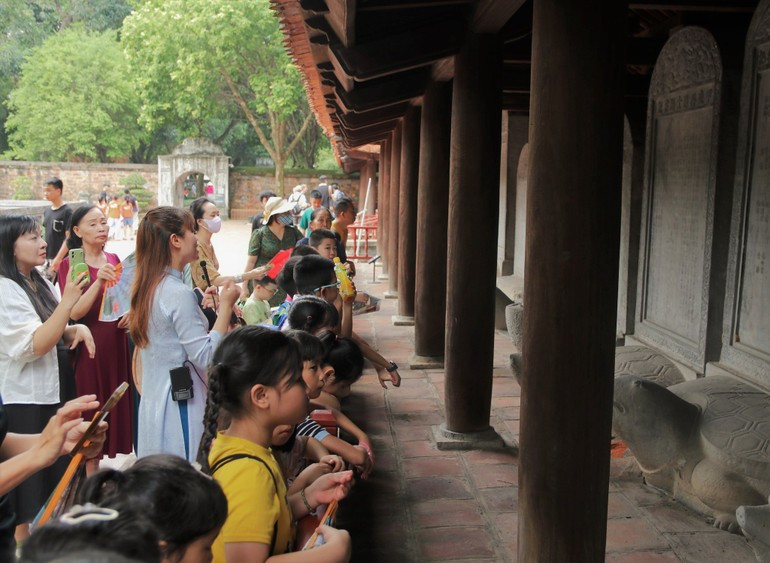
Thanks to this collaboration, tens of thousands of students each year have had the opportunity to explore the values of this world cultural heritage.
Similarly, the Centre for Cultural and Scientific Activities at the Temple of Literature – Quoc Tu Giam currently offers around 30 different heritage education programmes, aiming to pass on the spirit of learning and the scholarly traditions of Thang Long – Ha Noi in particular, and Viet Nam in general, to younger generations.
Since 2021, over 300 schools citywide have organised more than 2,500 traditional cultural experience activities for pupils at heritage sites, conducting outdoor lessons on Ha Noi’s famous cultural heritages. As a result, nearly two million pupils have had early access to the cultural values of Thang Long – Ha Noi right from their school days.
Through the implementation of local history classes, pupils gain understanding of heritage sites located right in their own neighbourhoods.
At Phuc Xa Communal House, which worships the national hero Ly Thuong Kiet, in Bo De Ward (Ha Noi), during a local history class for pupils of Nguyen Gia Thieu Secondary School, many were surprised to see the students performing a short play depicting the resistance against the Tong invasion during the 12th century under Ly Thuong Kiet’s command. This theatrical approach makes history more close and vivid for the students.
Nam Huong Communal House (Hang Trong Street, Hoan Kiem Ward, Ha Noi) is not only a site for pupils to explore heritage but also a place where the value of Hang Trong folk paintings is brought to life.
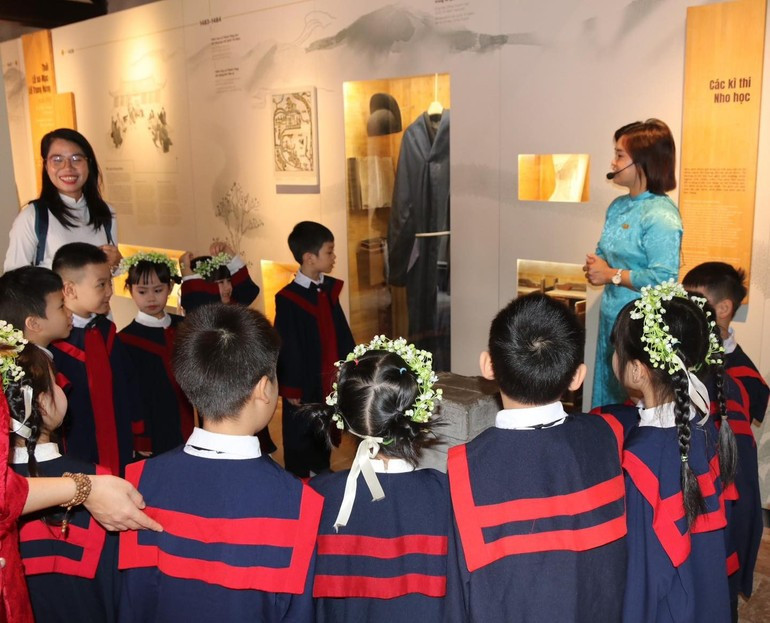
In Hoan Kiem Ward, pupils regularly participate in activities that explore and draw inspiration from Hang Trong folk paintings – a distinctive cultural heritage of scholarly Thang Long closely tied to the cultural life of the Old Quarter’s residents.
In addition, the city has launched many competitions such as heritage site presentations and “I Am a Tour Guide”, which attract participation from pupils across age groups and school levels.
Schools like the High School for Educational Sciences (under the University of Education, Viet Nam National University, Ha Noi) have also organised themed history camps, with booths and tents showcasing historical topics, customs, and heritage – all created by pupils themselves. Through these innovative “learn and play” methods, knowledge of Ha Noi is truly embedded into the lives of young students.
Intellectually capable, culturally graceful, physically strong
In Ha Noi, students at all levels are taught from the curriculum titled “Education on Civilised and Elegant Behaviour for Ha Noi Students.” This initiative to instil refined and civil conduct serves as a foundational approach to building the culture and identity of Ha Noi’s people.
From the beginning of primary school, pupils learn about appropriate language and behaviour within the family, at school, and in public places, through this educational programme.
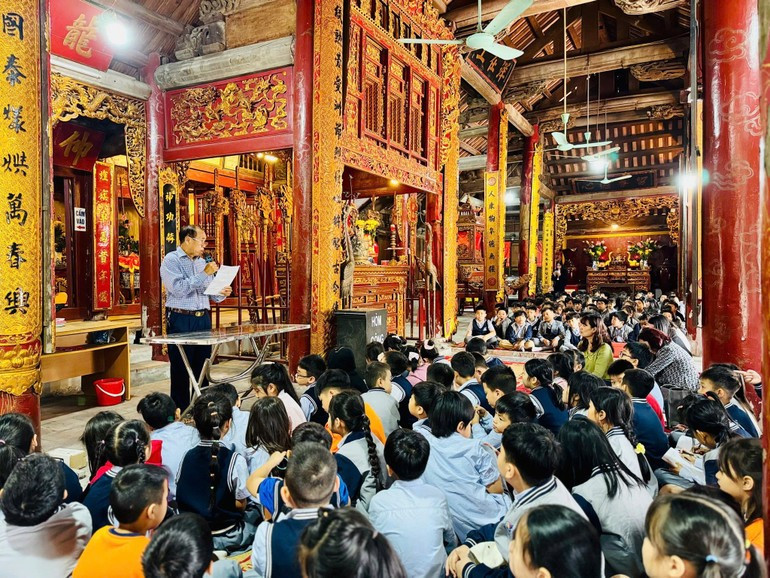
In addition to dedicated lessons, education on civilised and elegant behaviour is also integrated into subjects such as Morality, Civic Education, History, and Literature. Through these lessons, students develop a clear understanding of the cultural traditions of Ha Noi residents and the refined etiquette of Trang An people, which they are encouraged to practise in everyday life.
Notably, building on the general policy to promote cultured conduct, localities and schools have devised creative ways to convey messages about “graceful speech and beautiful behaviour” to students.
The greeting practice of “Hands folded – Smile – Bow” has been introduced in schools across Viet Hung, Long Bien, Bo De, and Phuc Loi Wards (former Long Bien District). Teachers consistently remind pupils to behave with courtesy not only at school, but also within their families and in society.
To set an example, school staff — from security guards to cleaning staff — have adopted polite manners when interacting with students, such as offering greetings, saying thank you, and apologising when appropriate. These actions have become part of students’ daily habits. This movement has since spread to many schools throughout the city.
At Cau Giay Secondary School (Yen Hoa Ward, Ha Noi), the model of “Smile, Be Polite, Bow” has been adopted. The school has also created forums for students to share their thoughts on this etiquette, fostering an environment where the spirit of graceful conduct becomes part of their character.
The Ha Noi Party Committee has issued a Directive to strengthen the leadership role of Party committees in promoting the image of elegant and civilised Hanoians. Following the Directive, diverse and creative methods of implementation have been seen citywide.
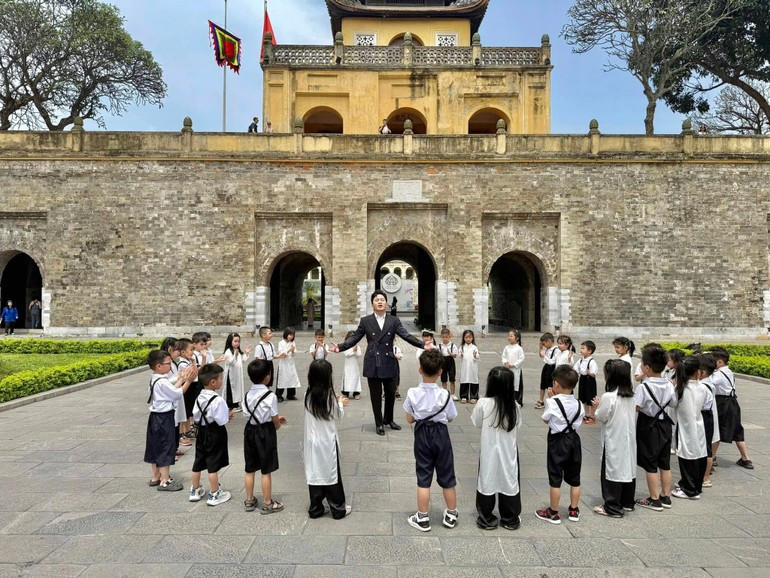
At Chuong Duong Secondary School, the campaign “The Greeting of Trang An People” is at the heart of the civil behaviour education effort. Meanwhile, Long Bien Secondary School focuses on the motto “Politeness Begins with the Smallest Acts.”
Students are guided and trained through seemingly simple daily actions: saying sorry when at fault, thanking others for help, speaking politely with friends, assisting those in need, and listening to others with respect.
At the primary level, schools use vivid methods to help younger pupils easily remember and absorb these teachings. Van Bao Primary School (Ha Dong Ward) not only impresses with its clean, green environment, but also with posters, banners, and slogans displayed throughout the campus offering gentle reminders such as: “Arrive on time,” “Be polite to teachers,” “Keep clean,” and “Dress neatly.”
To help children remember behavioural rules, schools have designed them in child-friendly formats. In the school’s library, rules outlining what students should and should not do are displayed in the form of an open book — inviting and approachable for young readers.
From the 2024–2025 academic year, the programme on civilised and elegant behaviour has also been extended to the final year of preschool, yielding early positive results.
Ha Noi is among the pioneers in implementing the Happy School model. Its criteria, suitable for the cultural identity of Thang Long – Ha Noi, are being studied and applied from the 2024–2025 school year. These criteria also tie the practice of etiquette in public spaces to the overall goal of building “happy schools.”
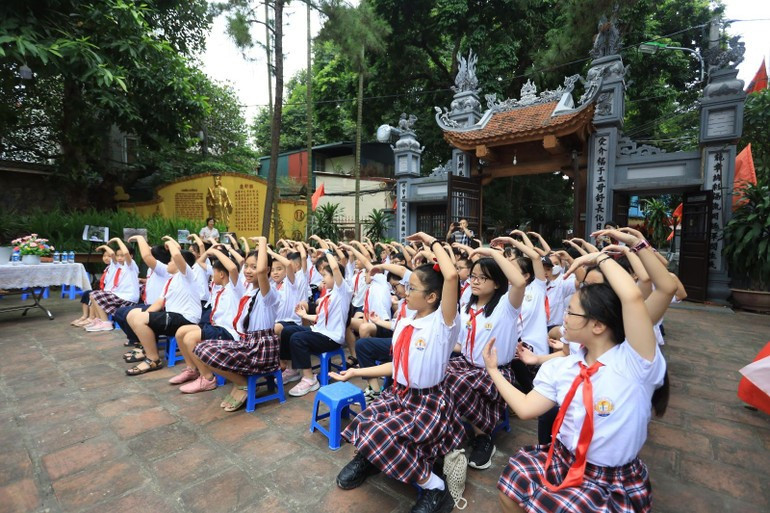
Moral education and etiquette training are being conducted in parallel with innovations in teaching methods, ensuring that Ha Noi’s students benefit from a holistic education. For many years, Ha Noi’s education sector has been a national leader.
According to the Ha Noi Department of Education and Training, over 99.7% of students in the city passed their upper secondary graduation exams, with 200 schools achieving a 100% pass rate. Ha Noi students also frequently represent Viet Nam in international competitions and bring home numerous pride.
In response to the suggestion of Party General Secretary To Lam during a meeting with voters from the former Ba Dinh, Dong Da, and Hai Ba Trung districts ahead of the 9th session of the 15th National Assembly, on the importance of educational quality and comprehensive development for Ha Noi’s children, the Ha Noi People's Council, at its 25th session in early July 2025, passed a resolution on subsidising meals for primary school students in day-boarding schools during the 2025–2026 academic year.
This measure ensures proper nutrition for students, particularly those in disadvantaged areas, and contributes to the emergence of a new generation of citizens in Ha Noi: intellectually capable, culturally graceful, and physically strong.
The refined character of Ha Noi residents is nurtured from an early age, equipping students with the confidence to integrate internationally in the digital age, firmly grounded in their identity and values.
